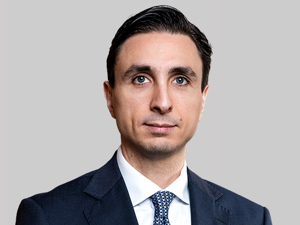East Capital New Europe Fund delivered a return of 16.1% during the quarter, underperforming the benchmark by 0.2%. Strong market contributors included Greece (+29.6%), Hungary (+20.9%), and Romania (+19.6%). Poland also delivered solid gains (+15.8%), despite presidential election turbulence, while Turkey posted a more modest 2.8% increase but remained our top alpha contributor due to a cautious underweight position.
Greece was the best-performing market, up 30%, with our holdings performing 31%, driven by investor confidence ahead of the country’s expected upgrade to developed market status, signalling improved economic fundamentals. Fiscal discipline, ongoing reforms, and steady EU fund inflows also supported growth, boosting bank valuations and market sentiment. Banks were by far the strongest performers, up 30-48% during the quarter. Alpha Bank was the best performer, up 48%, due to its lower valuation and increased cooperation and a potential bid from Unicredit. Alpha Bank is one of our larger holdings in the fund, and added 16 basis points of alpha. Another strong performer was our largest Greek holding, Optima Bank, up 46% during the quarter and adding 88 basis points to alpha. We met all our Greek banks during the quarter on our travels to Greece, and Optima remains our favourite, with one of the highest ROE rates among banks in Europe (24%) and a loan book set to grow by 32% in 2025-26. Furthermore, its EPS is growing by 15%-12%, the fastest in our markets, while the stock trades at 8.3x 2026e P/E. Theon International also performed strongly, up 41% in Q2, on the back of increasing sentiment towards the defence sector and the company’s ability to rapidly expand its backlog and grow sales at 30%+ in 2025, and potentially even in 2026.
Another strong performance came from Moldova, with Purcari Wineries delivering a strong 44% gain this quarter, contributing 75 basis points of alpha to the fund. A long-term holding in our portfolio, Purcari has received an attractive bid due to its leading position as Romania’s number 1 premium wine brand - with a 12% market share - and the largest exporter of Moldovan wine. The company’s vast portfolio spans 1,450 hectares of premium vineyards across Moldova, Romania, and Bulgaria, with the capacity to produce over 35 million bottles annually. A strategic bid from a Polish FMCG group came at a 49% premium, valuing the stock at 12x earnings – up from a low 8.6x P/E – highlighting the underlying value of profitable, well-positioned companies in the region and crystallising their value for long-term investors like us.
The Polish market gained an impressive 16%, supported by solid GDP growth estimated at 3.5-4%, soon comparable to China’s pace, and high double-digit corporate earnings growth that significantly outperformed the broader European market. While the presidential election saw the pro-EU candidate lose, the political impact remains limited, with the PiS government maintaining the status quo and avoiding early elections. EU funds are set to continue to flow smoothly until 2027, providing a vital anchor for economic expansion, supported by an expected loose fiscal stance and increased social spending. Attractive valuations at around 10x P/E, offering a significant discount on both Europe and emerging markets, have drawn investor interest. Still, short-term volatility in Poland led to banks’ performance weakening somewhat by the end of the quarter, as risks of a bank tax resurfaced. Despite this, our top pick in Polish banking, Bank Pekao, outperformed, gaining 22%, and added 35 basis points of alpha, partially because we trimmed bank exposure at the top of the market just before the election, anticipating some unfavourable results. On the negative side, market volatility punished several of our stocks in Poland. Anticipating fiscal spending and higher social benefits, we have been increasing our exposure to the consumer sector: grocery retailer Dino, clothing and footwear brands LPP and CCC, and e-commerce platform Allegro. However, some of these stocks were still punished due to unfavourable May-June weather in the region, and as a space added 113bps of negative alpha. We believe, though, that the cheap valuation of 6-6.5x EV/EBITDA, strong ca. 20% growth, and potential fiscal stimulus in terms of tax reductions, which could significantly increase average wages by 20% or more, signal a much stronger second half of 2025 for consumer stocks, where we now hold almost a 4% overweight. We also lost significant alpha on large Polish underweights like PKN Orlen, PGE, and CD Projekt, totalling 120 basis points; these saw some speculative surges, but we do not believe in their near-term fundamentals and hence remain underweight.
The Turkish market underperformed in Q2 2025, posting just a 3% gain, while our holdings rose by 12.1%, adding 178 basis points of alpha. Part of our portfolio’s strong performance includes short-term Turkish bonds, some maturing in August 2025, offering yields of 45-49% TRY. One of our top holdings in Turkey, IT company Logo, was up 24%, adding 14 basis points to alpha as the company continues to grow, with sales up by 11% in real terms, and trading at 6.7x EV/EBITDA. We lost 24bps of alpha in Enka Construction after a strong year-to-date performance, as the stock slowed amid a lower probability of and sentiment towards peace in Ukraine being achieved soon. However, we believe in the company’s strong construction pipeline, both in Turkey and abroad, even without Ukrainian projects, with a 32% year-on-year growth in its construction order backlog. We added somewhat to our UW position of Turkish equities in Q2 2025, anticipating a sustained disinflationary trajectory and credible monetary policy following the political turbulence in March and the central bank’s implicit rate hikes to support the currency and reserves. The central bank may warm up to rate cuts in July, which would support Turkish banks and corporates currently struggling in a very high-rate environment.
We remain optimistic and continue to seek the best selection of high-quality stocks demonstrating growth and strong balance sheets. East Capital New Europe Fund trades at an undemanding 8.9x P/E, with 14% year-on-year earnings growth, and offers a 4% dividend yield for 2025. We believe Eastern European markets offer a compelling fundamental story at very attractive valuations—20-30% cheaper than both continental Europe and emerging markets, benefitting from the momentum of capital inflows to Europe and emerging markets. The region combines higher growth, significantly lower valuations, and lower trade war and political risks. Moreover, the geopolitical risk premium related to the nearby Ukraine conflict is expected to decline over time, potentially unlocking new opportunities in Ukrainian reconstruction.
Performance in USD net of fees.
This publication is not directed at you if we are prohibited by any law in any jurisdiction from making this information available to you and is not intended for any use that would be contrary to local laws or regulations. Every effort has been made to ensure the accuracy of the information, but it may be based on unaudited or unverified figures or sources. The information should not be used as the sole basis for an investment. Please read the Prospectus and the KID, which are available on the fund page.












